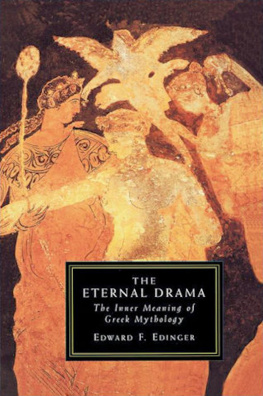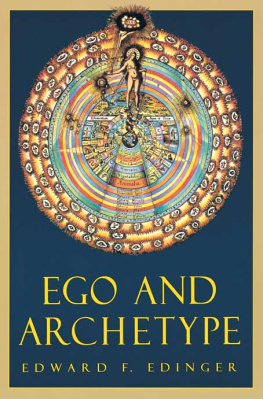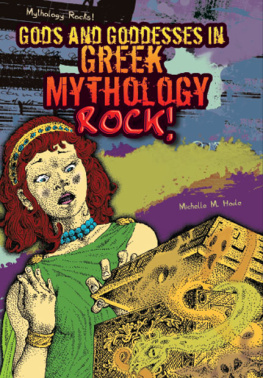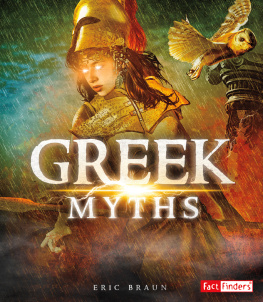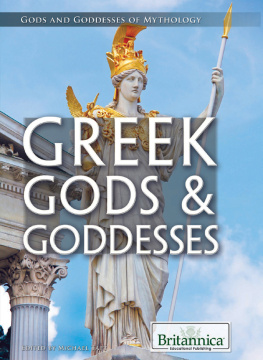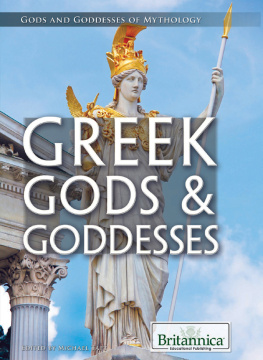A compelling answer to fundamental questions about why and how we should read myths.... A book rich with fresh readings of well-known myths, buttressed by illuminating linkages between the Greek, Hebrew, and Christian roots of our modern psyche.
Parabola
ABOUT THE BOOK
Zeus, Aphrodite, Apollo, Artemis, Athenado the gods and goddesses of Greece have anything to say to us that we havent already heard? In this book, based on a series of his lectures, the eminent Jungian analyst and writer Edward F. Edinger revisits all the major figures, myths, oracles, and legends of the ancient Greek religion to discover what they can still revealrepresenting, as they do, one of the religious and mythic foundations of Western culture. Building on C. G. Jungs assertion that mythology is an expression of the deepest layers of mind and soul, Dr. Edinger follows the mythic images into their persistent manifestations in literature and on into our modern lives. He finds that the gods indeed continue to speak as we grow in our capacity to listen and that the myths express the inner energies within all of us as much as ever. Heracles is eternally performing his labors, Perseus is still confronting Medusa, Theseus is forever stalking the Minotaur, and Persephone is still being carried off to life in a new realm.
EDWARD F. EDINGER, M.D., a founding member of the C. G. Jung Foundation for Analytical Psychology in New York, is the author of many books on Jungian psychology, including The Eternal Drama and Anatomy of the Psyche: Alchemical Symbolism in Psychotherapy.
Sign up to learn more about our books and receive special offers from Shambhala Publications.

Or visit us online to sign up at shambhala.com/eshambhala.
THE ETERNAL DRAMA
The Inner Meaningof Greek Mythology
EDWARD F. EDINGER

Edited by
DEBORAH A. WESLEY

SHAMBHALA
BOSTON & LONDON
2013
SHAMBHALA PUBLICATIONS, INC.
Horticultural Hall
300 Massachusetts Avenue
Boston, Massachusetts 02115
www.shambhala.com
1994 by Edward F. Edinger
Cover art: The marriage of Dionysus and Ariadne, from an Attic pelike, fourth century B.C.E. Archaeological Museum, Pella, Greece. Photograph by George Fafalis.
The page constitutes a continuation of the copyright page.
All rights reserved. No part of this book may be reproduced in any form or by any means, electronic or mechanical, including photocopying, recording, or by any information storage and retrieval system, without permission in writing from the publisher.
LIBRARY OF CONGRESS CATALOGING-IN-PUBLICATION DATA
Edinger, Edward F.
The eternal drama: the inner meaning of Greek mythology/Edward F. Edinger; edited by Deborah A. Wesley.1st ed.
p. cm.
Includes bibliographical references and index.
eISBN 978-0-8348-2868-1
ISBN 1-57062-673-1 (pbk.: alk. paper)
1. Mythology, GreekPsychological aspects. 2. Psychoanalysis.
I. Wesley, Deborah A. II. Title.
BF175.5.M95E35 1994 94-8331
292.13019dc20 CIP
Contents



I WANT to thank the editor, Deborah Wesley, warmly for her successful efforts to transform rough and scattered material into a relatively smooth and unified whole. Jung said that any renewal not deeply rooted in the best spiritual tradition is ephemeral. Greek mythology is the foundation of one part of our best spiritual tradition, and Jung has given us the means to assimilate this rich storehouse of archetypal imagery to the modern mind. May this book contribute to that goal.

THIS TEXT brings into written form for the first time Edward F. Edingers discussion of the psychological meanings to be found in Greek mythology, epic, drama, and religious practice. Presented in the 1970s as two series of lectures, one in New York City and one in California, the material shows the author mining the ore of Greek culture for the gold of psychological insight useful to modern individuals.
In the almost twenty years since the lectures were presented, Dr. Edinger, a noted psychiatrist and Jungian analyst, has brought forth books on the psychological dimensions of medieval alchemy, the Old and New Testaments, Melvilles Moby-Dick, and Goethes Faust, and he has spoken and written in explication of a number of C. G. Jungs later works. Throughout his writings, as in these lectures, he expresses his indebtedness to the seminal thinking of Jung, and carries Jungs ideas into fresh areas of thought and application.
Both Jung and Edinger have sought new understanding of the deep layers of the human psyche by burrowing into wide-ranging cultural contexts. This burrowing, motivated by the search for psychological insight rather than for scholarly learning in any specific cultural field, has been described by Edinger as poaching: We [Jungian psychologists] are constantly venturing into scholarly realms of history and anthropology and mythologyall the artstracking our prey... the psyche. Here, the territory broached belongs more conventionally to the classicist, yet in the hands of this expert tracker yields bountiful psychological material.
Readers may find that the broad scope of Edingers survey leaves them wishing for more material, a fuller development, and more discussion of the basic texts. Our hope in bringing the lectures to a wider audience is that readers may be led into their own exploration and imaginative musing on the meanings in the old stories, seeking their own connections to them.
The text of this book is a recasting of the original lectures and of an essay, The Tragic Hero: An Image of Individuation, which originally appeared in the journal Parabola. The Greek myths have come down to us in widely variant forms; the versions used here are for the most part those to be found in Robert Gravess The Greek Myths.
I want to thank Thornton Ladd, whose idea started this project, and who has been a creative collaborator from first to lastthe book is really a joint venture. The volume owes much as well to my husband, David Wesley, who acted as my editorial mentor and assisted generously in the editorial work. I am also grateful to George Elder, who brought the material of the New York lectures to my attention and continued with encouragement and helpful editorial advice. Further thanks are due Professor Douglas Domingo-Forast of the California State University, Long Beach, who provided many scholarly suggestions, and to David ONeal of Shambhala Publications. Finally, I thank Lyn La Cava, whose transcript of the original lectures sponsored by the C. G. Jung Institute of San Francisco preserved the material through all these years and provided the basis for this text.
Next page
